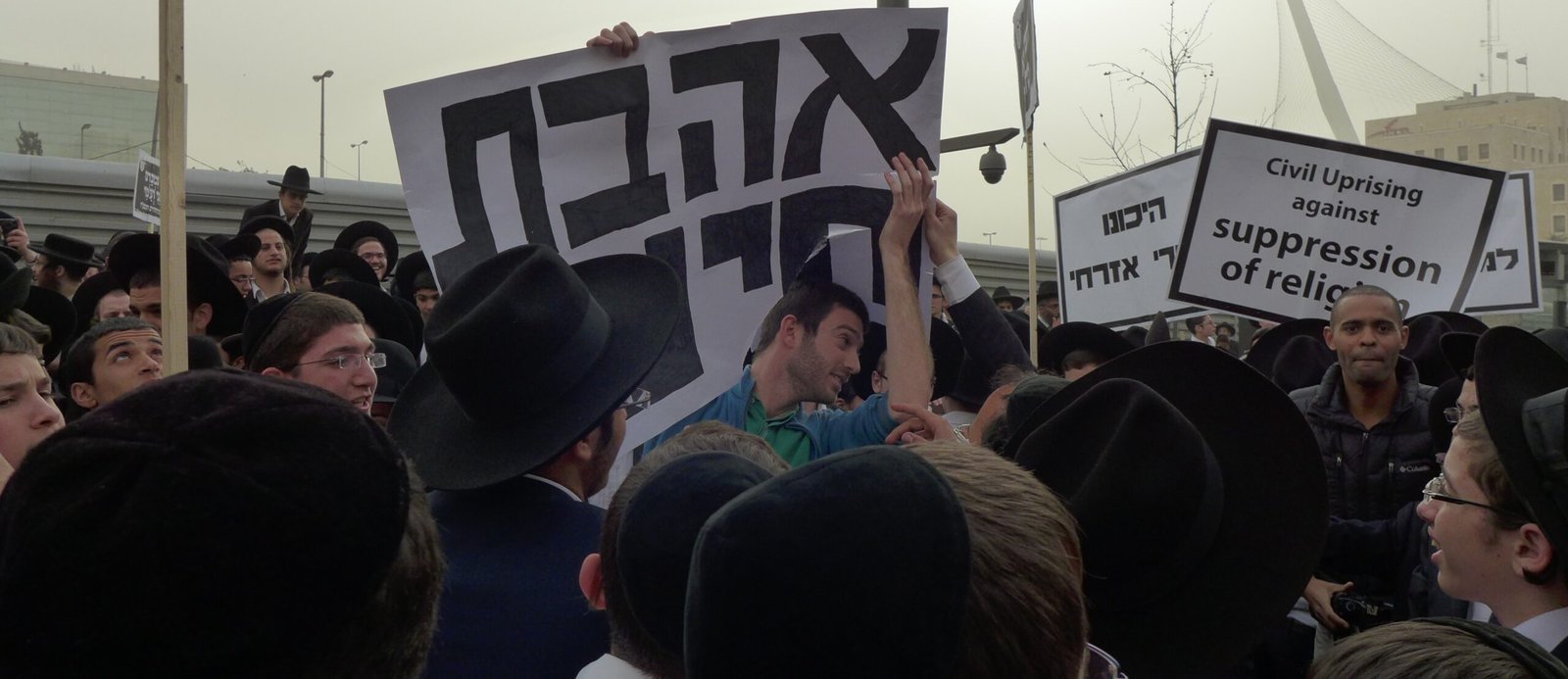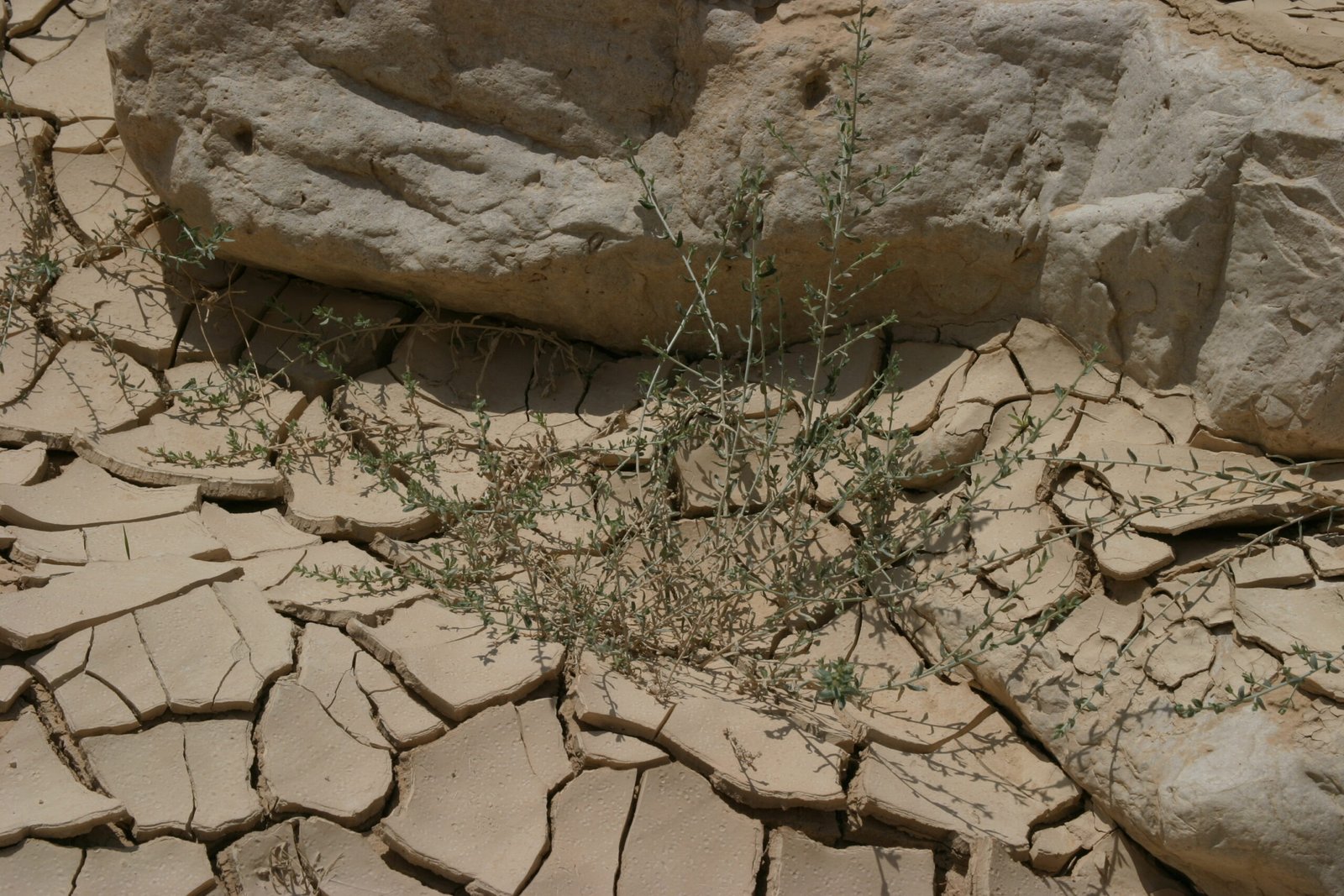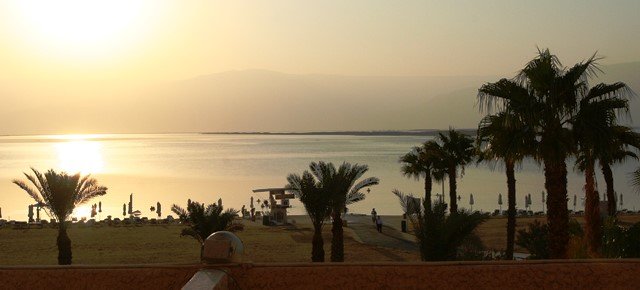Share This Story, Choose Your Platform!
We are picking up a crib for our grandchildren that I bought second-hand and therefore cheaply on the internet. The address is in Kiryat Yearim, a town near Jerusalem where many orthodox and ultra-orthodox Jews live. I ring the bell. The door opens and several small children look out. “Is mom at home?” I ask.
Shortly afterwards, the mother of the family appears in the doorway. She pushes a sturdy wooden bed into the hallway and even lends us a toolbox to take it apart for transportation.
The children stand curiously in the doorway. One of them is still quite small. “Why are you giving away the crib? You could still fit in,” I wonder. “Yes, but the crib doesn’t fit,” the children promptly reply. – “Where do you sleep then?” – “On mattresses!”
According to recent surveys, the birth rate among ultra-Orthodox women has fallen to 6.1 children. People in Europe do not differentiate between orthodox and ultra-orthodox Jews, lumping them together, so to speak. But there are many differences within the very diverse Israeli society. As among Christians, there are also a large number of groups, currents and religious communities in Judaism.
In Hebrew, the ultra-orthodox Jews are called “Haredim”. This term comes from the 66th chapter of the prophet Isaiah, where it says: “Hear the word of the Lord, you who tremble at his word!” The “Charedim” are the “trembling ones”.
Externally, the Haredim can be recognized by their clothing. The men wear a black suit and a white shirt, a hat on their heads or, on Shabbat, the famous “Streimel”, the fur hat that they have brought with them from Eastern Europe, depending on the custom. Women are obliged to dress modestly and not to wear “men’s clothing”. In addition to wearing skirts and dresses, other rules also apply to them. For example, the color red is prohibited because it attracts too much attention. They wear tights or stockings even in the hottest weather. Married women always have a head covering, which also includes the very popular wigs. You won’t find an elderly woman with her gray hair tied up among them.
The Haredim mostly live among themselves in their own communities in certain neighborhoods and places. In recent years, they have also moved to smaller towns such as Beth Shemesh and even to settlements in Judea and Samaria.
Of course, the rules they live by are not just about clothes. Strict observance of the Sabbath is especially important. They are firmly convinced that the Messiah will come when all Jews observe the biblical day of rest. From time to time, they organize demonstrations and, together with their numerous descendants of all ages, block the streets in Jerusalem that border their neighborhoods on Friday evenings. They chant “Shabbes, Shabbes”. Getting into such a mess is very unpleasant, even if the police intervene and try to free the stranded drivers.
The relocation of the ultra-Orthodox to places that were traditionally more or less secular is therefore not met with enthusiasm. There are people who leave their home of many years because of this. To be fair, however, it should be mentioned that participants in large left-wing demonstrations also block roads and even light bonfires on the highway – much to the despair and annoyance of many drivers. And they don’t do this on the day of rest, but precisely when many have to be on the road.
Israel is a democratic country with great freedom of expression. Sometimes one direction prevails, sometimes another. Ultra-Orthodox Jews have learned to find their way in this environment. They have their own political parties. They go to the polls, and they have been in government for years. For them, however, the rabbis are a greater authority than the head of state.
During the Covid pandemic, the then 93-year-old Rabbi Chaim Kanievsky instructed his students not to get tested for the coronavirus. During the third lockdown, however, he agreed to close the Talmud schools for a limited period of time. He himself fell ill with Covid 19 and recovered thanks to the self-sacrificing home care provided by his own people.
There are two main accusations against the ultra-Orthodox Jews, which can also be heard abroad. One is that they do not work and live at the expense of other people. The other is that they do not share the burden of army service with Israeli society as a whole.
On the first point, it must be understood that the study of the Torah and religious books is one of the highest values in ultra-Orthodox society. If one makes Torah his art or craft, it is considered a legitimate occupation.
In ultra-Orthodox society, marriage candidates are introduced to each other through mediation. Talmud students are the most sought-after marriage partners.
Almost all young ultra-Orthodox women go out to work. A particularly good job for an older woman is matchmaking, the “shidduch”. There is also an upward trend in employment in the secular sector among young men. The entire ultra-Orthodox society has changed in recent years, and young ultra-Orthodox are also successful at university.
In 2015, the Charedi conference for single professionals was the big news. Normally, the ultra-Orthodox start a family at a very young age. The children are then in day care and kindergartens. The older siblings look after the younger ones. Mathematics and English, core subjects in schools in Israel, are not taught in ultra-Orthodox schools. That is why the state is now trying to change this. The “Ofek Chadash” – “A New Horizon” – project promises financial support to those ultra-Orthodox schools that include English and mathematics in their curriculum.
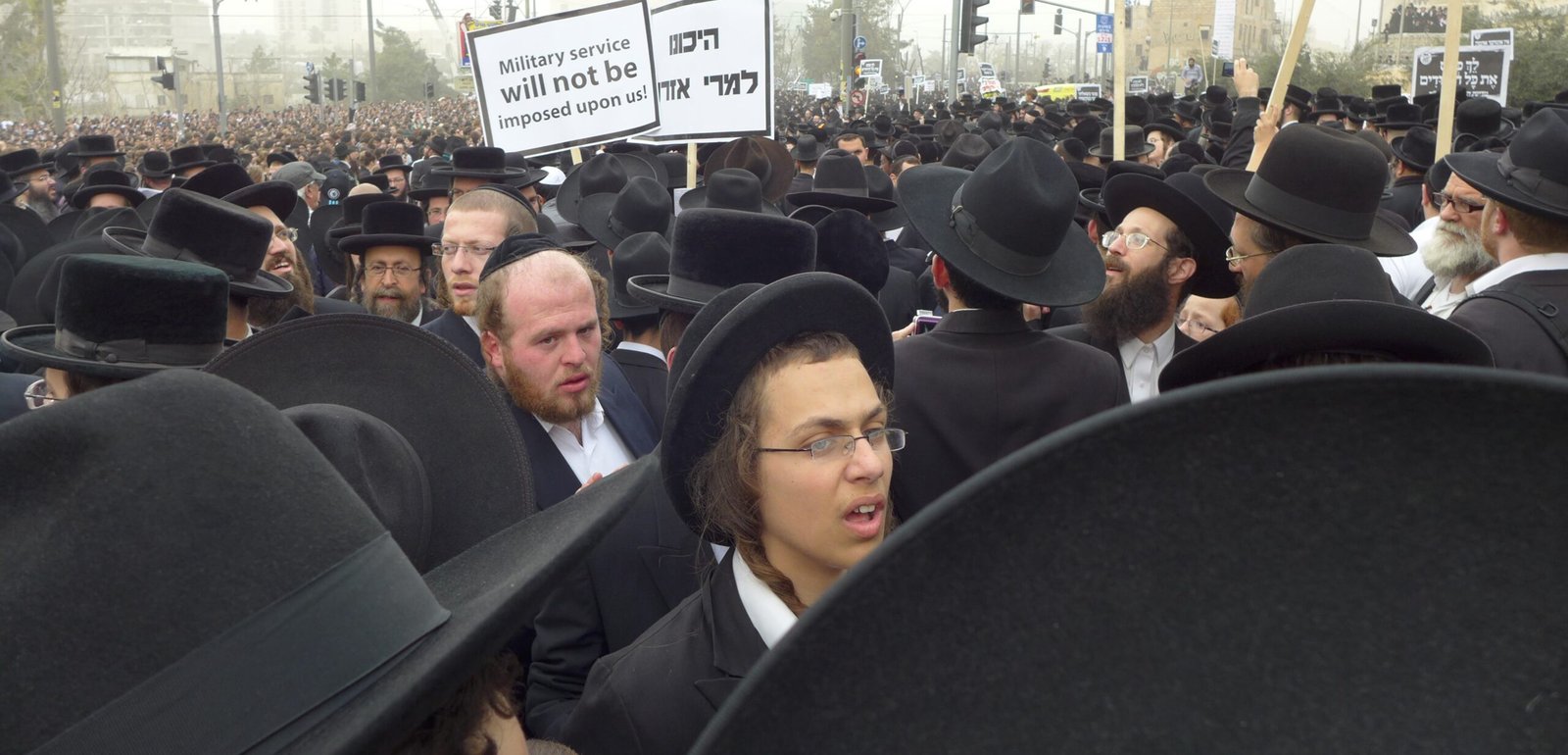
With regard to military service, it should be noted that a large percentage of secular society is also exempt from military service for one reason or another – not to mention the 20% of Arab citizens who are not subject to compulsory military service and of whom only a small proportion take up the option of alternative service, for example in social institutions. Of the Arabs, it is mainly Bedouins and Druze from the Galilee who have served in the Israeli army for generations and, for some time now, a small number of Christian Arabs.
Before we look at the arguments for and against military service for ultra-Orthodox Jews, we should recall how the exemption for the Haredim came about in the first place. When the state of Israel was founded in 1948, there were only around 400 Talmud students. In view of the Holocaust and the fact that religious Jews were disproportionately affected by the annihilation of European Jewry, it seemed logical to both the military and the political leadership of the Jewish state to exempt these students from compulsory military service. Nevertheless, many of them courageously took part in the defense in Jerusalem and other places.
Over the years, the number of Haredim has grown rapidly. They marry noticeably young and take God’s first commandment to mankind, “Be fruitful and multiply and replenish the earth”, absolutely seriously.
I recently met a friend at the post office who had his grandson in his arms. This grandfather is secular, the father of three grown-up sons. I asked him how many grandchildren he already had, to which he replied: “A drunk no longer counts the glasses!” – only to tell me with a smile that his eldest son, who has opted for the ultra-Orthodox way of life, has eleven children.
Over the years, there have been repeated efforts on the political stage to address the exemption of yeshiva students from compulsory military service. There are now around 63,000 ultra-Orthodox Talmud students in Israel. At the moment, it’s no longer about equality and carrying the burden of military service. The point is that the country simply needs more soldiers in a new war for its existence.
Israel sees itself fighting on seven fronts: 1. in the Gaza Strip and 2. in the Palestinian autonomous territories in Judea and Samaria against Hamas, Islamic Jihad and other terrorist groups. 3. against Hezbollah in Lebanon. 4. against the Houthis from Yemen. Then 5. against pro-Iranian militias in Syria and 6. in Iraq. And finally, 7. against Iran.
Ultra-Orthodox rabbis argue against compulsory military service that God’s peace will come and there will be no more war if all the people of Israel study the Torah and obey God’s commandments. They therefore see a serious danger when yeshiva students neglect their study of the Talmud – and, on the other hand, faithfulness in study as a real protection for the Jewish people, as a means against expulsion from the land, as it says in Leviticus 28:18: “For the land will also reject you if you defile it, as it rejected the people who were before you.” The Supreme Court’s decision to also conscript Talmud students described one rabbi as a “war against the Torah.”
In contrast, Orthodox Jews who serve in the army see the need to defend their country in battle, as described in the book of Nehemiah during the rebuilding of Jerusalem: “Those who built the walls and carried the loads worked like this: They did the work with one hand and held the weapon with the other. And every one that built had his sword girded about his loins, and so built…” (Nehemiah 4:11-12). Furthermore, these religious Zionists make the interesting point that among the twelve tribes of Israel there was only one tribe that was supposed to take care of spiritual matters.
Furthermore, the ultra-Orthodox opponents of compulsory military service fear that their young people will be corrupted and secularized in the army and never return to the bosom of their community. However, existing ultra-Orthodox units, such as “Netzach Yehuda,” follow strict halachic rules. Their motto is Deuteronomy 23:15: “For the Lord your God goes with you in the midst of your camp to deliver you and to give up your enemies before you. Therefore, let your camp be holy, that nothing shameful be seen among you and that he turn away from you.”
On the other hand, there are also voices from the secular part of Israeli society who fear that the entry of many Haredim into the army will tighten the religious rules throughout the army and that ultra-Orthodox soldiers will actually be more under the command of their rabbis than obeying the army leadership. Most recently, on January 2, 2025, it was announced that two companies, i.e. 180 soldiers, are starting to build a new ultra-Orthodox brigade, which will be called “The Hasmoneans”.
In October, it was reported that Chief of Staff Herzi Halevi had torn a “Messiah” patch from the uniform of a reservist in southern Lebanon. Halevi is said to have told him: “Only military symbols are accepted here.” Over the past year, Israeli soldiers have increasingly pinned non-military patches with different messages on their uniforms.
At the same time, those who are currently returning from the war agree that they experience a deep sense of unity during their deployment, regardless of which sector of society they come from. They cannot believe their eyes when they see the political disputes in Israeli society.
“Mashiach, Mashiach, Mashiach, oy yoi yoyoyoyoyoi…” is a well-known Jewish melody. In the face of unimaginable cruelty, deception, death and pain, many wish that the longed-for savior would come and bring peace. Among the ultra-Orthodox Jews there is a group that does not recognize the State of Israel at all and believes that only Messiah will establish a kingdom for Israel at his coming.
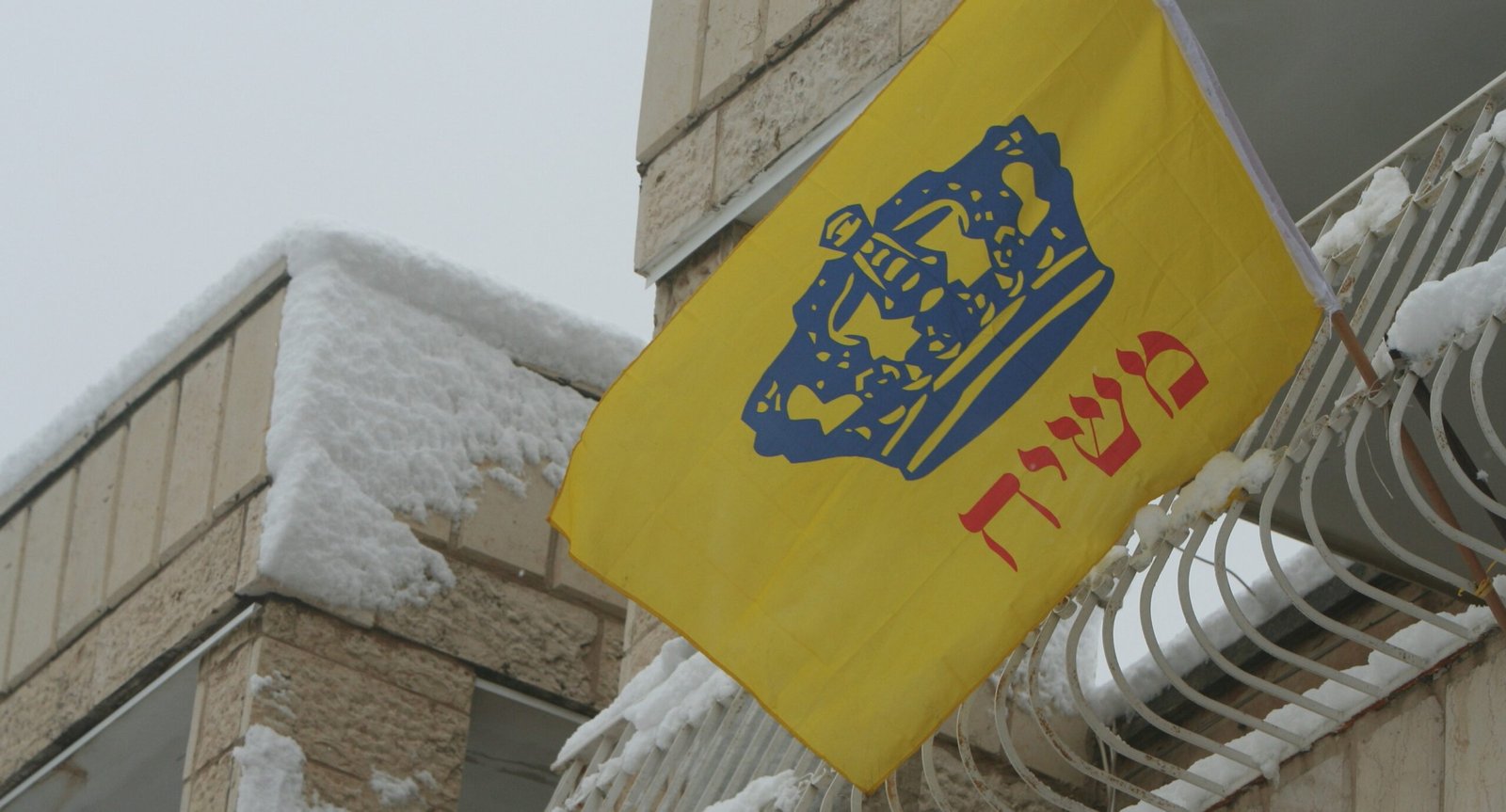
In recent decades, the yellow flag of the Lubavitcher Hasids with the image of the royal crown and the inscription “HaMashiach” – “The Messiah” has been appearing in public time and again. It is offered online for just 100 shekels, including the service of professional installation. This flag wants to proclaim on the street that the Messiah is coming and be an impetus to start a conversation about redemption.
A similar inscription “Melech HaMashiach” – “the King Messiah” appears on roadside posters, but then usually with the image of a bearded old man, the Lubavitcher Rebbe. The man in question is Rabbi Menachem Mendel Schneerson from a dynasty of Hasidic rabbis, perhaps the most well-known rabbinical personality of modern times. After the Holocaust, he dedicated himself to the revival of Judaism throughout the world. Under his influence, kindergartens, schools, Jewish community centers and youth camps were established. There are also Chabad centers where Orthodox families act as “ambassadors” for Jews and Israeli travelers all over the world, welcoming and caring for them. We recently received the sad news of the murder of Rabbi Tzvi Kogan, the head of the Chabad Center in the United Arab Emirates.
I myself once visited such a center with an Israeli group in Bangkok and experienced how it gives the Israelis a feeling of home when pita and hummus are served. A new Torah scroll was even driven through the capital of Thailand to this center, where visitors were then allowed to write one of the last letters themselves. Israelis, who otherwise hardly ever go to synagogue, queued up and enjoyed it.

The ultra-Orthodox organization “Zaka,” whose volunteers collect even the smallest remains of a human body after accidents and terrorist attacks in order to bury them with dignity, is of great service to Israeli society. After the massacre on October 7, the Zaka staff often reached the limits of their physical and mental strength. They had the challenging task of collecting the remains of the mutilated and burnt bodies.
In the debate and in the efforts to enshrine the recruitment of the ultra-Orthodox by the army in law, there is repeated talk of recognizing such and similar organizations, some of which have been active for decades, as alternative service.


